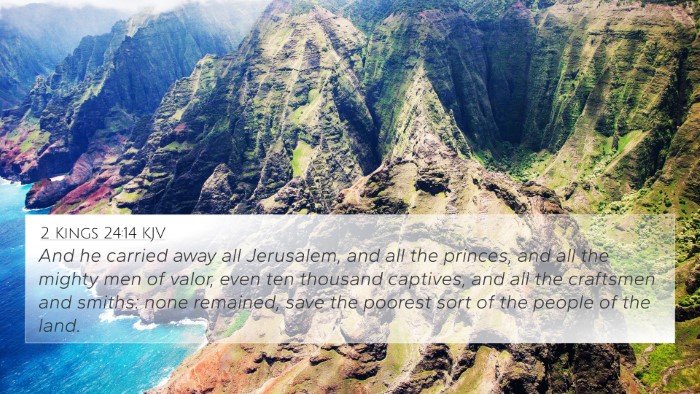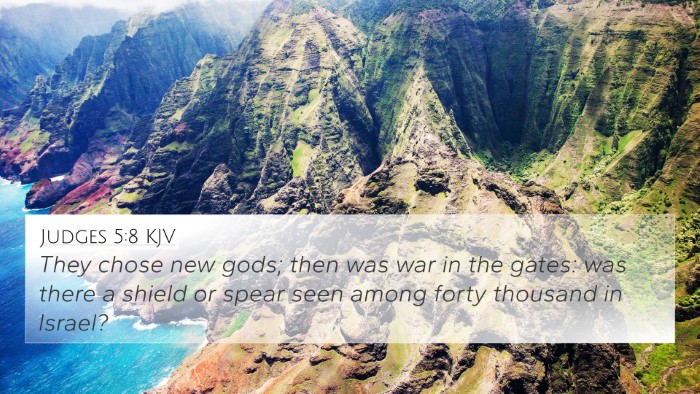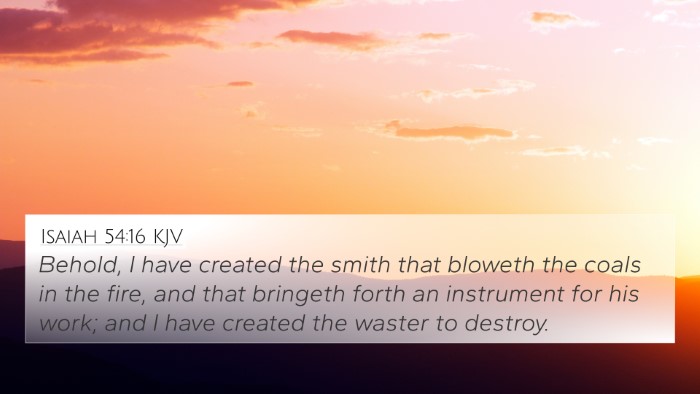Understanding 1 Samuel 13:19
Verse: 1 Samuel 13:19 - "Now there was no smith found throughout all the land of Israel: for the Philistines said, Lest the Hebrews make them swords or spears."
Summary of Meaning
1 Samuel 13:19 paints a picture of Israel's dire situation under Philistine oppression. The absence of blacksmiths signifies not only a lack of arms but also the suppression of the Israelite ability to defend themselves. This verse emphasizes the challenge faced by the Israelites in preparing for warfare and reflects the broader theme of dependence on God for deliverance.
Commentary Insights
-
Matthew Henry:
Henry notes that by preventing the Israelites from having weapons, the Philistines sought to subdue them completely. The focus on blacksmiths illustrates the strategic control the Philistines had, which left Israel vulnerable. Henry interprets this as an indication of Israel's spiritual and physical state—a people unable to arm themselves were also spiritually disarmed.
-
Albert Barnes:
Barnes emphasizes the complete domination of the Philistines over Israel. He explains that the lack of weapons wasn't merely due to economic conditions but was a deliberate strategy of oppression. This situation served as a broader metaphor for Israel's spiritual poverty and their reliance on God amid such despair.
-
Adam Clarke:
Clarke discusses the socio-political implications of this verse, noting that the lack of smiths implied not just military control but also cultural degradation. The Philistines established their dominance by controlling not only physical resources but also the means by which Israel could rise to self-defense. Clarke also suggests that this passage foreshadows the eventual need for a savior to restore Israel's hope.
Cross-References
This verse relates to several other Scriptures that discuss themes of oppression, warfare, and reliance on God:
- 1 Samuel 13:1-2: Establishes Saul’s reign and his initial military challenges.
- Judges 5:8: Reflects on the oppression of Israel and the lack of weapons during the time of Deborah.
- 1 Samuel 17:50: Shows David’s victory over Goliath with a simple sling, emphasizing God’s power over human limitations.
- Psalm 44:3: Speaks to the notion that victory comes not by sword but by God's favor.
- Isaiah 31:1: Warns against trusting in military power rather than in God.
- Ephesians 6:10-17: Discusses the armor of God, relating to spiritual warfare.
- 2 Corinthians 10:4:
- Hebrews 11:32-34: Enjoins the faithful of old who through faith conquered kingdoms and performed great exploits despite their circumstances.
- 1 Peter 5:8-9: Encourages believers to resist the adversary, drawing a parallel to standing firm in faith amid oppression.
- Psalm 20:7: Affirms faith in God rather than chariots and horses, aligning with the core theme of reliance on divine strength.
Thematic Connections
The themes of oppression and reliance on God found in 1 Samuel 13:19 resonate throughout the entirety of Scripture. By examining cross-references, we can uncover the rich interplay between narratives:
-
Oppression and Deliverance:
The struggle of Israel under Philistine control mirrors various biblical accounts where God's people face oppression. The ultimate deliverance of Israel through figures like Moses and Joshua showcases God's sovereignty even in dire situations.
-
Faith vs. Fear:
The Israelites’ fear in the face of the Philistines’ might is a recurring theme, as seen in various narratives, such as the desert wandering or Goliath's challenge in David's life. It teaches believers to place trust in God's abilities over their own limitations.
-
Preparation for Battle:
While physical preparation was necessary, the spiritual preparation emphasized throughout scriptures indicates that true strength lies in faith and obedience to God (Ephesians 6, 2 Corinthians 10).
Application
This verse, while historical, carries lessons relevant to today’s believers:
-
Dependence on God:
Much like the Israelites relied heavily on God for deliverance, modern believers are called to acknowledge their need for divine intervention in their struggles.
-
Spiritual Warfare:
Understanding that our battles are primarily spiritual helps believers navigate their challenges with faith rather than fear.
-
Community and Support:
The absence of smiths symbolizes not just lack of resources but also community. Encouraging one another and seeking collective strength in faith can empower believers today.
Conclusion
1 Samuel 13:19 offers a snapshot of the Israelites' condition, both physically and spiritually. Through the insights of respected commentators and valuable cross-references, we see the interconnectedness of Biblical themes and how they inform our understanding of faith and reliance on God. Engaging with these texts through careful cross-referencing enriches our study and application of scripture in daily life.






